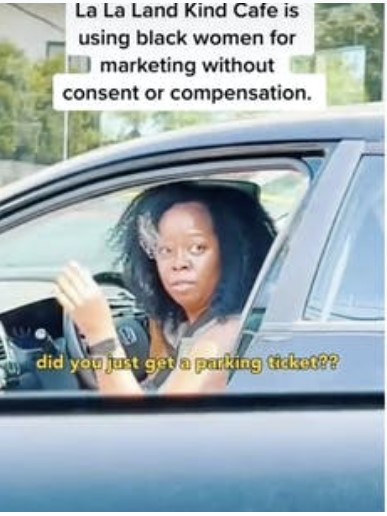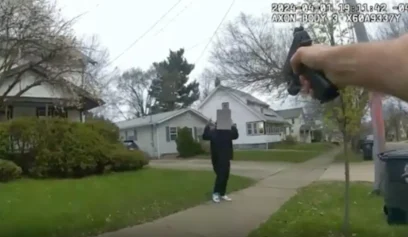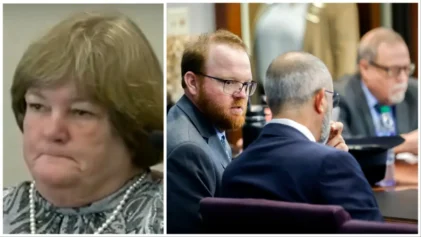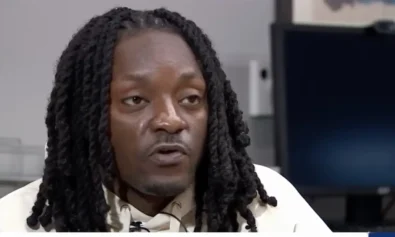A coffee shop franchise whose mission is to bring people joy through random acts of kindness used a Houston woman’s likeness to promote the chain in a video and caused her a great deal of distress, she claims.
After the lady blasted them on TikTok for the unauthorized use of her image and likeness in one of its clips uploaded this month, the company removed the video from their page.

On Tuesday, May 24, Debra Johnson called out employees of La La Land Kind Cafe, which has locations in Los Angeles, Dallas, and Houston, for what she claimed was secretly recording her being pranked and uploading the footage to the popular social media app TikTok in its 61st drive-by kindness video, this one from Houston.
The woman, who says she felt “ambushed” during the encounter, also is enraged that business did not seek to compensate her for the use of her likeness.
The drive-by kindness videos typically feature La La Kind Cafe employees accosting random people on the street and giving them compliments on their appearance, and sometimes giving them money or flowers or other gifts.
In her own TikTok video, an appeal to enlist the public to put pressure on the company to remove her from their campaign, she stated she wishes she didn’t have to do this because normally she is a very private person. However, Johnson said the business left her no choice after she submitted several requests for them to remove the now viral video.
The lawyer and blogger says, “They are using the video to promote their cafe and other business endeavors without my consent and without any compensation to me for the marketing value that they’re receiving from using my image and likeness.”
“They have done this to many other people and especially to creators of color who are featured in some of their most viral videos,” she tells the viewers, although most people featured in the videos appear to random passersby, not “creators.”
Johnson, a Houston-based blogger, further explained that the seemingly innocent “act of kindness” not only is exploiting her for profit, but made her feel violated.
“From the outside looking in it may seem like an act of kindness but what happened to me was that I was ambushed,” the woman states, before describing the timeline of the impromptu production.
“They followed me down the street when I was minding my business. They pulled up behind me and blocked my end. They played a joke on me while recording me,” she says.
Johnson confessed that in the video she is “very startled” and starts to “nervously laugh” in response to the unwanted attention. But she insists the filming was not consensual — neither did she agree to allow them to use it in a professional capacity.
She stated clearly, “I did not provide permission for them to use my image. I am not their customer and they need to take it down.”
In the video, someone from the company asks Johnson while she is in her car, “Did you just get a parking ticket?”
“’Cause you got fine written all over you,” the person says before the startled lawyer could answer.
The portion of the now removed video that featured Johnson totals six seconds and shows the woman looking confused and then culminates with her laughing.
According to the Digital Media Law Project, Johnson had a legitimate argument, saying that most states allow individuals to sue for the unauthorized use of their image and likes and that “there are two distinct legal claims that potentially apply to these kinds of unauthorized uses.”
The first of the two is called “misappropriation” which is the “invasion of privacy through misappropriation of name or likeness.” The second violation is called “right of publicity” which is “the right of a person to control and make money from the commercial use of his or her identity.”
If Johnson was looking to sue, she would have had to establish three elements: Use of a Protected Attribute (demonstrate the company used an part of her identity that is protected by the law); For an Exploitative Purpose (show the company used his name, likeness, or other personal attributes for commercial or other exploitative purposes); and No Consent (establish that he or she did not give permission for the offending use).
Johnson, based on her assertions in her post, believed she could have substantiated misappropriation and right of publicity. If she can prove this, she may be entitled to financial compensation.
She said she not only went through the proper online channels, set up by the app and the company’s various social media profiles, she reached out via email on Monday, May 23.
In addition to asking the company to remove the video, she also reported the video to TikTok. On Wednesday, May 25 she wrote under another post, “@TikTok did not take the video I reported down despite the privacy violation. They have an interest in keeping viral videos up.”
The perseverance worked.
Later on Wednesday, Johnson made a post stating the video had been pulled down thanks to pushing and the advocacy of others. Her celebratory caption stated, “The video has been removed!!! Unfortunately, it has been shared and reposted elsewhere but I will try to get the reposts taken down as well. In the meantime, this was a victory!”
She posted an accompanying meme to further punctuate the win, thanking “everyone who commented and showed support or interest.” She further stated, “it made a huge difference.”
“My hope moving forward is that they will ask people for consent before posting them, compensate people when appropriate and take down unauthorized videos upon request.”
Now the attorney, with her 343 followers, is using her platform to create awareness around Black women and girls being exploited by companies to get views.


